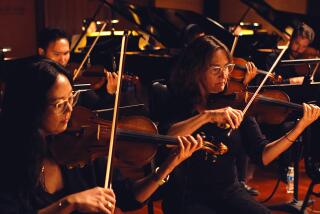A One-Man-Band Who Puts Some Teeth in a Hippo’s Bite
- Share via
Musically speaking, they are not his proudest moments.
In the mid-1960s, Robert Boress strode onstage in his powder-blue suit and paisley tie whenever he played pep rallies and proms in Fairfax County, Va., with his band, the Changing Times. A versatile performer, he played Chopin preludes at piano recitals and strummed Roger Miller tunes on his acoustic guitar for the Lions Club.
“My dream as a kid was to have a house filled with all the musical instruments,” Boress says. “And that I could play each of them well.”
In a home studio the size of a spare bedroom, technology has enabled Boress to fulfill that dream. With a digital sampling keyboard, a well-equipped computer and a battery of synthesizers, Boress, now 48, composes and records music with all the instruments of an orchestra as well as sounds of his own invention.
Technology has changed the way music is composed and performed, particularly music for television. “Fifteen years ago, I would have needed a stopwatch, a calculator, reams of scoring paper, an orchestra, a recording studio, sound engineer, conductor and lots of aspirin to write a score,” Boress says.
To compose a score for a Fox series on wild animals, Boress first jots down words such as “suspense” and “‘danger” while he watches the video. As a group of tourists paddles down a gentle stretch of the Zambezi River in Africa, Boress plays a few notes on his keyboard to re-create the sound of a bass section bowing a low C. The moment a hippopotamus spots the canoe, Boress adds a swelling cymbal to heighten the tension. When the hippo swims closer, he adds the sound of French horns and the voices of a choir.
A few more clicks, the strings bow faster and the voices grow louder. The moment the hippo bites the arm of a tourist, kettle drums resound. Because Boress records his work on computer disk, he is able to make last-minute changes. In the final cut, the hippo attacks the tourists sooner, and Boress shortens his score.
“Almost everyone in television now uses electronic scores versus live musicians,” says Michael Horner, an agent and partner at Film Music Associates in Hollywood. “The problem is that producers are paying less money for scores and giving composers less time to write them.”
Boress has composed music for television programs shown on NBC, CBS, PBS, HBO, Showtime and the Discovery Channel, as well as for several films. Nonetheless, he has mixed feelings about the technology that allows him to work as an independent composer. He misses the camaraderie and stimulation that comes from working with other musicians. And despite the advances in digital sound technology, says Boress, it cannot replace the nuance of traditional acoustic instruments.
It is telling that when inspiration eludes him on his digital keyboard, Boress heads for his upright piano. “The sound of a vibrating string still has a unique ability to touch a listener’s soul.”
*
Gali Kronenberg is a freelance writer and regular contributor to The Times. He can be reached at gali.kronenberg@latimes.com
(BEGIN TEXT OF INFOBOX / INFOGRAPHIC)
BIO BOX
* Name: Robert Boress
* Job: Freelance composer for film and television
* Education: Bachelor’s degree in English from Occidental College, 1971
* Home: Los Angeles
More to Read
The biggest entertainment stories
Get our big stories about Hollywood, film, television, music, arts, culture and more right in your inbox as soon as they publish.
You may occasionally receive promotional content from the Los Angeles Times.










